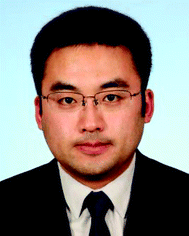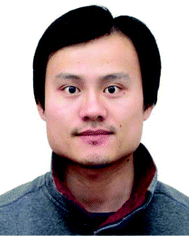Celebrating the work of Young Thousand Talents Plan researchers
This profile article celebrates the work of researchers who are part of the Recruitment Program for Global Young Professionals (known as the “Young Thousand Talents Plan”), a prestigious programme in China that identifies researchers who have the outstanding potential of becoming leading figures in scientific research. Here we highlight some of the researchers who are part of this programme who published their research in Organic & Biomolecular Chemistry in 2017.
Professor Jiang completed his PhD from Shanghai Institute of Organic Chemistry (SIOC) in Professor Shengming Ma's group and postdoctoral research from the Scripps Research Institute (TSRI) in Professor K. C. Nicolaou's group. Now, he is the ‘Shanghai Eastern’ professor of East China Normal University. His group focuses on organosulfur chemistry and natural product total synthesis. He has published more than 70 papers and has 20 patents authorized. He has been awarded an Asian Core Program Lectureship Award (Japan & Singapore), Thieme Chemistry Journal Award, Wuxi Life Chemistry Award, National Youth Talent Support Program, National Natural Science Foundation–Outstanding Youth Foundation, and National Young Scholar of the Changjiang River, and others.
Recent developments in sulfur–carbon bond formation reaction involving thiosulfates (DOI: 10.1039/C6OB02833K)
Dr Chuanliu Wu is a professor of chemistry at Xiamen University. He received his BSc and PhD in chemistry from Xiamen University, China. He then pursued postdoctoral work at the Swiss Federal Institute of Technology Zurich (ETH Zurich), Department of Chemistry and Applied Biosciences, with the financial support of an ETH Fellowship (2010–2012). After that, he joined the College of Chemistry and Chemical Engineering at Xiamen University. He obtained the support of “Young Thousand Talents” programme from China in 2014. His current work is mainly focused on the development of multicyclic peptides constrained with noncanonical disulfide bonds and rigid small molecules, and the screening of multicyclic peptide affinity reagents for chemical biology or biomedicine.
Stabilization of peptides against proteolysis through disulfide-bridged conjugation with synthetic aromatics (DOI: 10.1039/C6OB02786E)
Gang Li was born in 1983 in Fujian, China. He received his BSc from the University of Science and Technology of China in 2005. He obtained his PhD at the University of Wisconsin–Madison under the supervision of Professor Richard P. Hsung in 2009. Following one year of postdoctoral training at Emory University with Professor Albert Padwa, he moved to the Scripps Research Institute as a research associate with Professor Jin-Quan Yu in 2010. Supported by the “Young Thousand Talents” programme, he started his independent research at Fujian Institute of Research on the Structure of Matter, Chinese Academy of Sciences as a professor in 2013. Research in his group includes the development of new transition-metal-catalyzed reactions for the activation of small molecules such as CO2.
Sulfinyl isobutyramide as an auxiliary for palladium(II)-catalyzed C–H arylation and iodination of benzylamine derivatives (DOI: 10.1039/C7OB01163F)
Qiuling Song is currently a professor of chemical engineering, director of Institute of Next Generation Matter Transformation at Huaqiao University, China. She obtained her MSc in organometallic chemistry from Peking University (China) and her PhD in organic chemistry from Princeton University, USA. Dr Song was selected as “the Recruitment Program of Global Experts (Young Thousand Talents Plan)” on Aug. 2012, and at the end of 2013, she was awarded as “Hundred Talents Plan of Fujian” and was appointed as vice president of Huaqiao University Youth Federation at the same year. Currently her research interests involve C–C bond and C–H bond activation and functional transformation, boron chemistry, radical chemistry and green chemistry.
Umpolung of protons from H2O: a metal-free chemoselective reduction of carbonyl compounds via B2pin2/H2O systems (DOI: 10.1039/C7OB00820A)
Xinjun Luan received his BSc and MSc degrees from the Northwest University in 2003 and 2005, and completed his PhD at the University of Zurich in 2010. After a postdoctoral stay with Professor Barry M. Trost at the Stanford University, he returned to the Northwest University, starting his independent research career as a Full Professor in 2012. His research is currently focused on the development of new synthetic methods to activate C–H bonds and aromatic systems simultaneously using transition-metal catalysis, and their application in the synthesis of natural products and active ingredients.
Palladium(0)-catalyzed [2 + 2 + 1] cyclization of 1,6-enynes with vinyl bromides: a highly diastereoselective synthesis of tetrahydro-1H-cyclopenta[c]furans bearing two quaternary carbon centers (DOI: 10.1039/C7OB00768J)
Zhan Lu was born in 1981 in the Zhejiang Province. He received a BSc (2003) and a PhD (2008) under the supervisor of Professor Shengming Ma in Chemistry from Zhejiang University. After postdoctoral research with Professor Shannon S. Stahl and Professor Tehshik P. Yoon at University of Wisconsin–Madison, he returned to Zhejiang University in 2013 and joined the chemistry faculty. In the same year, he was supported by the “Young Thousand Talents” programme. Currently his research interests focus on asymmetric catalysis via earth abundant transition metals and radical chemistry.
Recent advances in chiral imino-containing ligands for metal-catalyzed asymmetric transformations (DOI: 10.1039/C6OB02817A)
| This journal is © The Royal Society of Chemistry 2018 |






